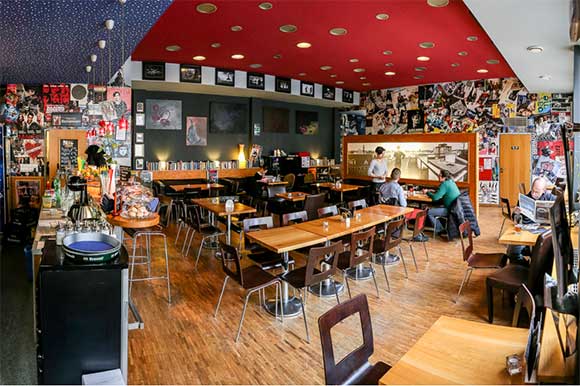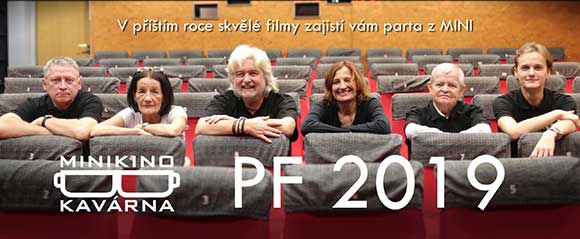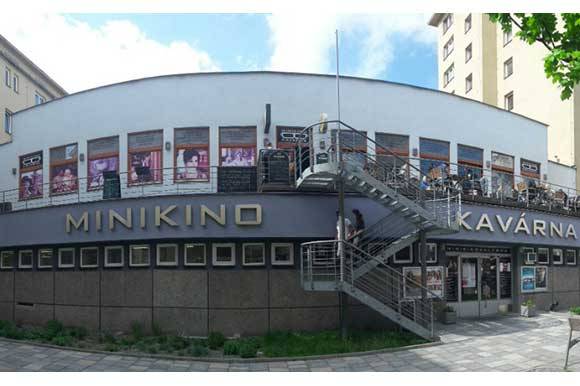 Minikino Kavárna is a small art cinema (70 seats) in the very centre of the town of Ostrava with a stylish film-themed café / bar. The cinema screens minimally two films a day and it also runs specialised weekly screenings for seniors, children and for its Film Club members.
Minikino Kavárna is a small art cinema (70 seats) in the very centre of the town of Ostrava with a stylish film-themed café / bar. The cinema screens minimally two films a day and it also runs specialised weekly screenings for seniors, children and for its Film Club members.
Minikino has been screening films for decades and it went through a massive modernisation at the turn of the millenium. It is now an important cultural spot in Ostrava and it cooperates with film festivals, it hosts official film premieres, film workshops and various cultural events.
FNE: What is the biggest challenge of running a cinema such as yours?
Michael Bukovanský: Minikino is quite small and therefore we do not screen CGI epics too often. We are trying to educate and to entertain our audiences, and therefore the biggest challenge we face is to prove that we offer more than the multiplex screening theaters.
FNE: What kinds of films do you prefer to screen and why?
Michael Bukovanský: We mostly focus on European films, because there are not many cinemas in Ostrava that would actually screen them for locals. We also try to focus on world cinema as much as we can, but we do not screen so-called "mainstream cinema" too often (only  at our night screenings).
at our night screenings).
We try to screen films that are interesting, entertaining and which also share the same artistic values. That is how Minikino is seen by its audiences.
FNE: The cinema is home to many festivals, events and film weeks. Why are these important and what do they achieve?
Michael Bukovanský: We cooperate with people from film festivals on a weekly basis. Every month we screen films from at least two festivals which are focused on themes or cultures e.g. Nordic, Spanish, French, German, Russian or Balkan films, documentaries, film events or we screen films from festivals like Cannes, Berlin, Venice or Karlovy Vary.
These events are important because they offer a wide scale of themes and at the same time they are very attractive for our audiences.
FNE: What is the role of Europa Cinemas for cinemas such as your cinema and why is it important?
Michael Bukovanský: We are part of Europa Cinemas because we support the distribution of European films to Czech audiences. Europa Cinemas helps us finance the events and everything for running the cinema Minikino smoothly.
FNE: How does a cinema like yours serve the local community?
 Michael Bukovanský: Minikino is located in the very centre of Ostrava and therefore many local film and TV premieres take place here. We also organise outdoor screenings in the summer. We run the local Film Club on a weekly basis and we also have specialised screenings for senior people. On some occasions, we can perform closed screenings for big groups of people and companies or for social events.
Michael Bukovanský: Minikino is located in the very centre of Ostrava and therefore many local film and TV premieres take place here. We also organise outdoor screenings in the summer. We run the local Film Club on a weekly basis and we also have specialised screenings for senior people. On some occasions, we can perform closed screenings for big groups of people and companies or for social events.
FNE: Can you say something about your work with young audiences?
Michael Bukovanský: Every Saturday and Sunday afternoon we screen films for children. In the morning we screen films for schools (elementary, high schools, universities) on a weekly basis. We support local film artists and we give them the opportunity to screen their films.
FNE: What about the digitalisation of cinemas? How is it affecting your work and your cinema?
 Michael Bukovanský: We are just about to change our old projector for a new one, but we think that the digitalisation of our cinema wasn't such a difficult process and it made some aspects easier.
Michael Bukovanský: We are just about to change our old projector for a new one, but we think that the digitalisation of our cinema wasn't such a difficult process and it made some aspects easier.
Contact:
Minikino Kavárna, Kostelní 3
Ostrava, Czech Republic
Phone: +420 776 750 308 / +420 559 527 851
www.minikino.cz
This email address is being protected from spambots. You need JavaScript enabled to view it.




















